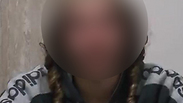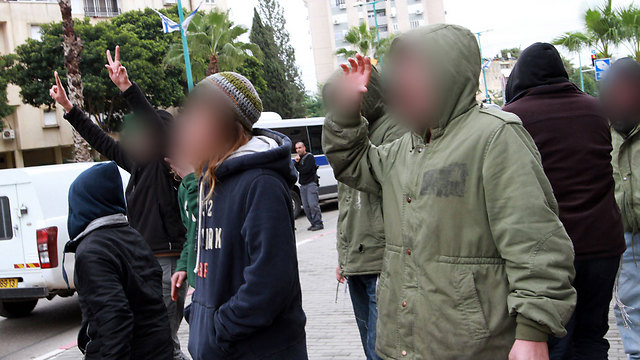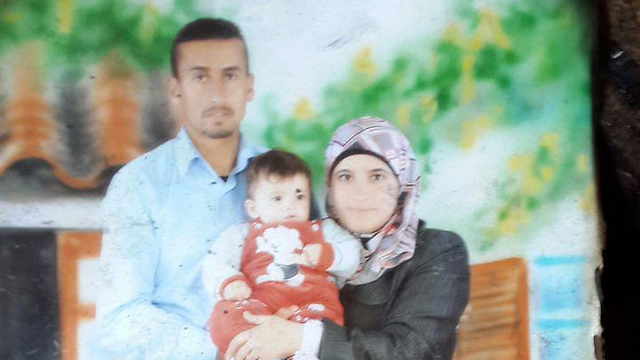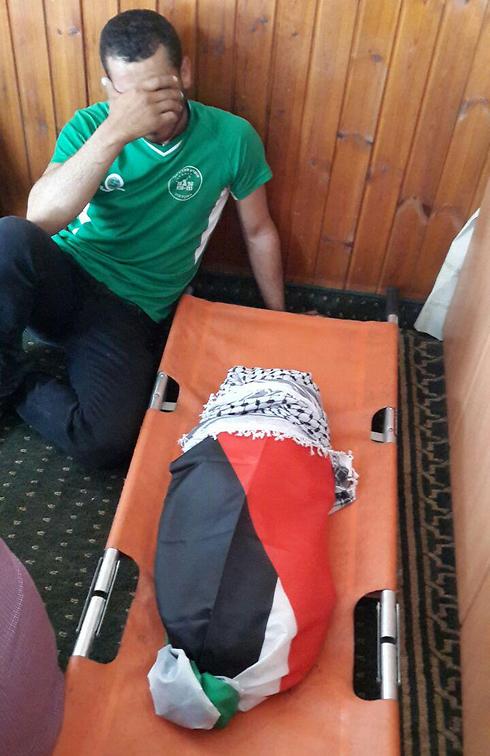
Youth who assisted in Dawabsheh murders one of 'Samaria elite'
His mother is an educator, his father is a rabbi in a northern West Bank settlement, and they live in a large and well-kept house. How did 'a good guy from a good home' become a central activist in Jewish terror, according to the indictments against him?
Alongside the indictment of Amiram Ben-Uliel for carrying out an attack in Duma that murdered three members of the Dawabsheh family, E., a minor, was also charged with being an accessory to the crime.
E., 17, grew up in a well-known and established settlement in the northern West Bank. The fact that he is underage means that his identity remains under wraps even after the general gag order over the Duma investigation was lifted.
He is being charged with a series of "price tag" activities, including vandalizing Jerusalem's Dormition Abbey, an arson attack on a Palestinian taxi near the village of Yasuf, the setting alight of a storage unit in the town of Aqraba near Nablus, an attack on a Palestinian shepherd in Kochav HaShahar and slashing tires in Beit Safafa in Jerusalem.
E.'s story differs a little from that of the other suspects. He grew up in a family that could be described as part of the religious-Zionist elite in the northern West Bank. His mother is an educator and his father is a settlement rabbi, and they live in a large and well-kept house.
"I remember him as a good guy from a good family," said one of the family's neighbors. "They didn't give any impression of being extremists, not in their views or in their conduct."
Another neighbor added: "They are an exemplary family. Salt of the earth. It's difficult to believe that their son could be involved in something like this."
And yet, E.'s life led him out of the structure of educational institutions. Up until two years ago, he studied in a yeshiva in the Binyamin area, but at some point he decided to drop out and stopped going to school.

He went to live in illegal outposts in the northern West Bank, including Baladim, and started to work odd jobs. A friend described him at that time as a charismatic individual who lived ascetically.
At that time he got to know Ben-Uliel, the central suspect in the Duma murders, along with other price tag suspects. At the Baladim outpost, he and his friends absorbed the ideology of the "Revolt" group.
According to the Shin Bet, the dozens of youngsters belonging to the group have developed a new anti-Zionist ideology with the aim of overthrowing the government, crowning a king of Israel and rebuilding the Temple.
Nonetheless, a family acquaintance said that "even though he went 'around the hilltops,' he stayed in close contact with his family. They maintained a good, open relationship. There were differences of opinion but they always spoke."
According to the charges, in July 2014, E. started to take part in price tag activities that caused serious damage to Palestinian property. He was interrogated by the police and the Shin Bet in connection with these crimes, and they resulted in him receiving administrative orders restricting his movement in the northern West Bank.
E. and his friends boasted that they knew how to deal with Shin Bet interrogations. In a video uploaded to YouTube about a year ago, E. can be seen saying: "In one of the interrogations the interrogator said to me, 'you don't want to talk,' and tried to tell me that my friends had talked. He didn't know that I knew that these were old practices they use afresh each time."
In the video, E. continues: "I don't cooperate with people who sabotage the Jewish people, representatives of the foreign government in our land."

According to the main charge, which accuses him of assisting with the murders in Duma, he spoke with Ben-Uliel about the possibility of carrying out an attack avenging the murder of Malachi Rosenfeld.
The two met in an outpost known as Yishuv HaDa'at in order to plan the attack, even conducting reconnaissance of Duma and the village of Majdal nearby. The pair looked at the possibility of setting houses on fire in both places at the same time.
Afterwards, according to the charge, E. observed the villages through binoculars and updated Ben-Uliel with his conclusions. They arranged to meet in a cave in the outpost on the night of the murder, but E. did not turn up at the appointed hour and Ben-Uliel carried out the attack on his own.
AE was arrested on November 25. His parents and sister were also interrogated. Claims that E. was tortured arose during his arrest, but the Shin Bet fiercely denied the accusations.
Honenu, a legal aid organization, claimed during his arrest that E. had tried to commit suicide due to the conditions he was facing, but the Shin Bet denied this as well.
In one of the hearings to extend E.'s arrest that took place at the Magistrate's Court in Petah Tikva, E. told Judge Erez Nurieli: "They're taking me apart. They're twisting my whole back. They're laughing, looking at me with contempt.
"They're turning me upside down until my hands are burning. I feel as if they're burning me with a lighter. Every day it goes up a level and I don't know what's coming tomorrow," E. continued to the judge.
"After a whole night of abuse I told them, 'Kill me and don't do this to me. Give me poison. I'm begging – I can't take it anymore.'"
In the wake of the hearings, the judge who ruled on the extension of E.'s arrest was subjected to a wave of incitement.

Those close to E. claim that the charges against him are based on confessions that were gained under torture. "Before this he was interrogated about other incidents, Dormition (Abbey) and others. But he denied all involvement," one said. "I believe that these incidents were 'solved' after he underwent torture."
As for the hilltop youth, who slipped through the cracks in the system and who are sometimes compared to youth at risk, an associate of the family said: "This is not youth at risk. Their motives are good and pure – the desire to make an impact, to be involved socially. To be partners in a process and to advance an ideology that goes beyond talk – the land of Israel, settling.
"They are doing this in a difficult period of terror attacks, in a fraught security situation. They have a very good connection with their parents. In the settlements there is a thin line between being a good person who does good things and breaking the law," he said.
In response to E.'s indictment, Chai Haber, his lawyer, said: "Sadly we have come to a day which is a badge of shame for the rule of law in Israel. The charges are based on confessions extracted from people under torture and severe violence."
On the state's request to conduct proceedings under a gag order, Haber said: "The intention was not to expose the public to the serious things that are being done in the interrogation rooms.
"But it's in precisely this kind of situation that the public has the right to know and be exposed to the full details," Haber continued.











